Defending the Right to Education
• Organize Today to be Decision Makers
• Parents and Teachers United in Opposing Testing and Common Core
•
The Political and Psychological Essence of High Stakes Testing •
Albany Action: Full Funding for Education Now• School Peace
Majahzi Jacque, Emerald Wilcox, Denzel Loyd, Narasonda Gibbs and staff of the Center for Teen Empowerment
Budget and Education Battles Show Necessity
Organize Today to be Decision Makers
 The majority of people in Buffalo, like those statewide and across the country, are anti-war. They are demanding an end to U.S. wars end all U.S. troops home now. They want government to reflect the will of the majority on these matters. Instead, the federal government just passed a budget that provides more than half of all funds to the Pentagon, $572 billion, including more than $85 billion for war in Afghanistan. Overall, the $1.1 trillion budget includes more than $649.7 billion for war and repression and only $122.8 billion for education, housing, jobs and the environment combined. That is more than five times more public funds for war at a time when there is a broad and repeated demand to Stop Funding War and Fund Our Rights!
The majority of people in Buffalo, like those statewide and across the country, are anti-war. They are demanding an end to U.S. wars end all U.S. troops home now. They want government to reflect the will of the majority on these matters. Instead, the federal government just passed a budget that provides more than half of all funds to the Pentagon, $572 billion, including more than $85 billion for war in Afghanistan. Overall, the $1.1 trillion budget includes more than $649.7 billion for war and repression and only $122.8 billion for education, housing, jobs and the environment combined. That is more than five times more public funds for war at a time when there is a broad and repeated demand to Stop Funding War and Fund Our Rights!
People in Buffalo, including many youth, have also been fighting to defend the right to education and to protect the environment by demanding a ban on fracking, the dangerous and toxic method for drilling for natural gas and oil. January saw a demonstration in Albany to Ban Fracking Now! Protesters demanded that Governor Cuomo reflect the will of the majority, not the oil and gas monopolies, by supporting a ban. As signs brought out: Democracy Means New Yorkers Decide, Not Cuomo!
January also saw a rally in Albany calling for full funding now for education. It included visits to various legislators representing Buffalo, demanding that they fight for such funding. It also saw meetings uniting parents and teachers in the struggle to oppose the Common Core and fight for a system of public education that serves the public good. No one is satisfied with the current state of the public schools but the Common Core and its testing regime is serving to humiliate youth and teachers and force them to engage in activities they know are wrong and harmful. As signs brought out, Common Core Harms Children and Education Yes, Common Core No! A December rally also emphasized parents and teachers are united in defending the right to education and the conditions necessary for teachers to teach and children to learn.
On all these fronts what stands out is that government, whether at the federal or state level, is not submitting to the will of the majority. On the contrary, it is acting directly against that will. And this in the face of repeated actions and demands of all kinds expressing the anti-war, pro-social will of the people.
This reality raises the necessity for the people themselves to be the decision makers. The existing political set up needs to be changed to reflect this necessity. And that change is in our hands and is one for today. This means, for example, that when it comes to education, we cannot limit our fight to appealing to those in power and relying on them to decide. We cannot limit ourselves to reacting to those decisions. We cannot accept a position of humiliation, of begging those now in power. Ours is a fight for political power and decision making by us and for us. It is a pro-active stand that advances our fight for our rights independent of what legislators may or may not do.
Concretely this means giving priority to organizing among ourselves to strengthen our unity, fighting organization and common thinking. Such work of learning and working together is in our hands, not those of the politicians. It means organizing collectives that together deliberate on problems and make decisions concerning what actions to take and how to take them. It means rejecting the notion that one or two people decide and the rest simply follow. Or that matters of content — of the stand, the demands, the justifications, the information and elaboration needed — are left to chance and not a central matter for decision making by all.
It takes conscious collective work together in the fight for our rights to ourselves become decision makers. Buffalo Forum urges all to think about this necessity to Organize Today to be Decision Makers. And we will be stepping up our efforts to join with all those fighting and assist in building fighting collectives of conscious decision makers.[TOP]
Buffalo-Area Meetings Build Organizing Efforts
Parents and Teachers United
in Opposing Testing and Common Core
 Meetings to oppose the humiliating and harmful testing of young students continued in the Buffalo area in January. These follow a militant rally in December opposing the Common Core and calling on all to refuse the tests. They also added to the struggle taking place to defend the right to education and fully fund education now, including a demonstration in Albany January 14.
Meetings to oppose the humiliating and harmful testing of young students continued in the Buffalo area in January. These follow a militant rally in December opposing the Common Core and calling on all to refuse the tests. They also added to the struggle taking place to defend the right to education and fully fund education now, including a demonstration in Albany January 14.
The January events on testing included one at University at Buffalo south campus to inform parents and teachers about the testing regime of the Common Core, hear their experiences and assist in refusing the tests. Another took place in East Aurora, also to provide information and a space for teachers and parents to elaborate their experience and opposition to the testing. A third was planned for Niagara Community College but was canceled due to emergency weather conditions.
These and other meetings have brought to the fore the united stand of parents and teachers to work together to improve the quality of public education and prevent the child abuse the testing imposes. They also brought out that it is the teachers, staff, parents and students that know what is needed, have important experience and need to be the decision makers on matters of education.
The tests are designed by a private monopoly, the results kept secret, and teachers are not even permitted to talk about them. Participants emphasized that for tests to serve an educational purpose, teachers must take part in designing them and evaluating them, so as to use them as a means to identify problems for students and assist them in overcoming them. The current testing regime directly blocks this and instead serves to humiliate the youth and label them as failures. Parents and teachers repeatedly brought out that the youth are not the problem, the testing regime is! It is child abuse and must be refused!
East Aurora Meeting
The East Aurora meeting of about 50 people was mainly teachers, some parents and some school board members. The discussion focused on the testing regime. A superintendent emphasized that the tests were not diagnostic and were not reliable. Teachers responsible for giving the tests were not permitted to discuss them or see the results. Instead students are rated, using a test not designed by educators, and the results used to arbitrarily label them as 1, 2s, 3s or 4s.
A 5th and 6th grade teacher with 20 years experience spoke to the subject modules now being imposed. She explained that the module for 6th grade English was scripted every day, repeatedly jumped between the novel and other materials, and in the end did not even finish the novel. Students are not being allowed to learn and analyze literature, but rather to read an isolated paragraph, out of context and then answer questions. It is a method contrary to well-established teaching and learning methods and one that does not educate.
Testing of Kindergarten Children
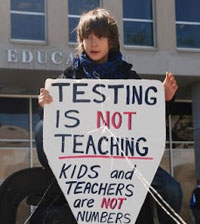 A kindergarten teacher brought out that kindergarteners are being repeatedly tested, despite claims by Education Commissioner King to the contrary. The tests are generally 15 minutes long and happen about 20 times a year. Once or twice a year they are an hour long — for kindergarteners, who often do not have the fine motor skills necessary to fill in the bubbles on the answer cards.
A kindergarten teacher brought out that kindergarteners are being repeatedly tested, despite claims by Education Commissioner King to the contrary. The tests are generally 15 minutes long and happen about 20 times a year. Once or twice a year they are an hour long — for kindergarteners, who often do not have the fine motor skills necessary to fill in the bubbles on the answer cards.
While the state claims there should not be testing for K-2, they have approved the test instruments. They insist that it is necessary to “prepare” young children to take tests. They want all students to be part of their data collection and regimented from the very start. So kindergartners are being tested.
As the teacher explained, one of the tests is a 2-hour multiple-choice test given over several days. Such a test is not age-appropriate. As well, teachers only receive a bar graph for the results, which is not helpful. She said the testing is especially frustrating and difficult for such young children and harmful to teaching and learning.
An English teacher explained and demonstrated various ways that she evaluates students, using projects and constructions she brought to the meeting. She elaborated how this method allows her to see a wide variety of factors, while also encouraging the individuality and creativity of students. Teaching to the test, on the other hand, is a very narrow way to view students. She spoke to how this extremely narrow test result is now key to the student’s future, the teacher’s future, the principal’s future, the school’s, the superintendent’s, and the district’s.
Project with Mozambique Students Forced to End
Another English teacher with 13 years of experience spoke to how the testing regime is time stolen from the classroom and the many ways teachers use to teach and that students learn. She told the story of how her family has many adventurers. Her aunt and uncle ended up living in Mozambique for a number of years, working in a school in very primitive conditions.
She and the aunt decided to have their respective students be pen-pals. Just sending and receiving the mail was a huge undertaking. Even so, the project was whole-heartedly taken up by the students here and in Mozambique. Over a period of several years, students felt excitement and purpose, and the effort brought to the fore fondness and friendship among the students and the importance of learning about and helping each other. The students here shared their experience with the whole school. Now the project will have to end as the testing regime and all it involves takes up so much classroom time.
A Question of Who Decides
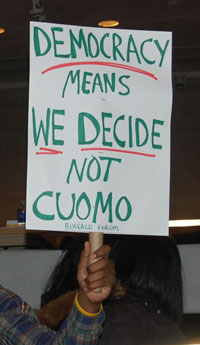 A professor from D’Youville posed the question of why the testing and Common Core are being done. He elaborated that the Common Core reflects definite political interests and values of those with power. Those who set the standards gain power and those who give up a role in deciding lose power. He said evaluating and assessing in the classroom, elaborated by the teachers who spoke, is a form of power and using standards. Those standards, which the practitioners, the professionals, the teachers make use of in their classroom, through literally millions of “data points” and decisions every hour, also reflect values and interests.
A professor from D’Youville posed the question of why the testing and Common Core are being done. He elaborated that the Common Core reflects definite political interests and values of those with power. Those who set the standards gain power and those who give up a role in deciding lose power. He said evaluating and assessing in the classroom, elaborated by the teachers who spoke, is a form of power and using standards. Those standards, which the practitioners, the professionals, the teachers make use of in their classroom, through literally millions of “data points” and decisions every hour, also reflect values and interests.
This educational decision making is increasingly leaving the classroom, leaving the school building and leaving the district. Removing decision making lessens the ability of the practitioners to affect changes or effectively deal with the many problems and choices one must make as a teacher.
Removing decision making and thus capacity to act as a means to block teachers and the whole community from taking action in their interests. It blocks the community’s values, interests and power.
He emphasized that the reforms are not about learning or education. They are about power and controlling the purpose of education. Who controls? Who decides? The Common Core is a means to make sure that it is not teachers, staff, parents and students who decide. It is a means to block and eliminate the role of the public in matters of public education.
He spoke to the theory of motivation guiding the reformers. It is based on high stakes, which is a reference to gambling and risk-taking — concepts that are not appropriate for children or teaching. The use of rewards and punishment are also known to undermine the ability of teachers to teach and students to learn.
Having fewer and fewer executives controlling education, as is now occurring, leads to more extreme rewards and punishment. For example, Governor Cuomo has proposed that if you teach to the test you will get a $20,000 bonus. In other words, if you submit to doing what you know to be wrong and harmful, you will be rewarded. If you do not, you will be punished, as will your students. He brought out that there is a long history in education showing that pay-for-performance is harmful and an attack on the rights of teachers and students.
He concluded by emphasizing that the fight over the Common Core is primarily a fight over who decides? The issue of who controls and decides the content and quality of the public schools is crucial and one all concerned need to address.
As this meeting and others have emphasized, it is those involved in the work of teaching and learning, the teachers, staff, students and parents who must decide. Working today to ourselves be decision makers is integral to the fight for the right to education. A critical part of this at present is keeping the initiative in our own hands. It is not a matter of waiting to see what King or various legislators decide. It is a matter of what we decide!
The current organizing is playing an important role in building the unity of parents and teachers and providing public space for the public to inform and educate itself and advance its interests. The various efforts are being organized by a number of forces, including the Partnership for Smarter Schools, Western New Yorkers for Public Education, Buffalo Teachers Federation, New York State United Teachers and Buffalo Forum.
We salute all those taking part and join in stepping up efforts to defend rights and develop a modern democracy where We Decide!
[TOP]
The Political and Psychological Essence of High Stakes Testing
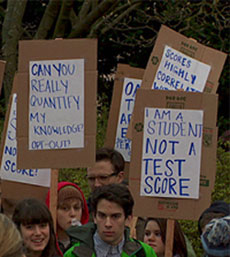 Two upcoming events I will be participating in highlight the need to re-think the fundamentals of how we govern our schools and how we think about motivating the students and educators who work in them. The first event: the “Southtowns Education Summit” in East Aurora is this Thursday, January 16. At that event, I will focus on the political nature and history of high stakes testing. The second event is a workshop I have organized along with my colleague to present an alternative way to think about student motivation. It will run on Tuesday, January 28. Both events are premised on the need to carefully think about the nature of high-stakes testing and to take up concrete work to propose alternatives.
Two upcoming events I will be participating in highlight the need to re-think the fundamentals of how we govern our schools and how we think about motivating the students and educators who work in them. The first event: the “Southtowns Education Summit” in East Aurora is this Thursday, January 16. At that event, I will focus on the political nature and history of high stakes testing. The second event is a workshop I have organized along with my colleague to present an alternative way to think about student motivation. It will run on Tuesday, January 28. Both events are premised on the need to carefully think about the nature of high-stakes testing and to take up concrete work to propose alternatives.
What is High Stakes Testing?
At one level, everyone knows what high-stakes testing is — yet, the significance of the principles upon which this policy is based are not regularly discussed or evaluated as central to the debate about education reform. And while high-stakes testing is certainly an education policy, it is important to consider if high-stakes testing, as such, is really about education per se.
To begin, consider this: what are “high stakes”? Some definitions: “if you have high stakes in something such as a venture or decision, you have a major interest in its outcome”; “to play for high stakes, to gamble on something very important”; “used to describe a situation that has a lot of risk and in which someone is likely to either get or lose an advantage, a lot of money, etc.”
What strikes me here is the connection the concept “high stakes” has with gambling, venture philanthropy, and zero-sum gaming scenarios. I highlight these because we tend to underestimate the power of metaphor in influencing not only how we think about something, but also what appears as possible alternatives when discontent emerges. On its face, gambling, extreme risk and zero-sum games seem inappropriate metaphors to guide us in educating the young.
According to the Glossary of Education Reform, A high-stakes test is “Any test used to make important decisions about students, educators, schools, or districts, most commonly for the purpose of accountability — i.e., the attempt by federal, state, or local government agencies and school administrators to ensure that students are enrolled in effective schools and being taught by effective teachers. In general, “high stakes” means that test scores are used to determine punishments (such as sanctions, penalties, funding reductions, negative publicity), accolades (awards, public celebration, positive publicity), advancement (grade promotion or graduation for students), or compensation (salary increases or bonuses for administrators and teachers).”
Let us consider what this definition reveals about high-stakes testing, and how it should be classified.
The Political and Psychological Essence of High Stakes Testing
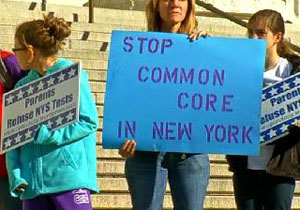 Two things stand out. First, high-stakes testing should be classified as political in nature, related to a method of governing: its purpose is to control people. High-stakes testing itself is not about education, but rather about controlling education institutions and those who work in them (teaching and learning are both forms of work). On its face, such a mode of governing does not appear to be in sync with ideas of self-government or democratic participation. Those few who control the tests and attach high stakes to them — federal and state executives, private corporations and foundations — gain control over elected school boards, schools and those who work in them. They direct schools to serve their interests.
Two things stand out. First, high-stakes testing should be classified as political in nature, related to a method of governing: its purpose is to control people. High-stakes testing itself is not about education, but rather about controlling education institutions and those who work in them (teaching and learning are both forms of work). On its face, such a mode of governing does not appear to be in sync with ideas of self-government or democratic participation. Those few who control the tests and attach high stakes to them — federal and state executives, private corporations and foundations — gain control over elected school boards, schools and those who work in them. They direct schools to serve their interests.
The second thing is this: high-stakes testing aims to control people using a punishment and reward system. It assumes and imposes on educators, students, and their families a very specific understanding of human motivation (“extrinsic motivation”), one that is premised on the logic of venture capital (risk), narrow self-interest (win rewards, avoid punishments, even if others suffer) and against the idea of a general public good, one that does not diminish if accessed by more and more people (zero-sum games).[1]
This motivational premise is both behaviorist in nature — think of unenlightened forms of dog training — and privatized, narrowly competitive. From this vantage point, the name of the Obama administration’s signature education policy — “Race to the Top” — carries great significance. Thus, under the tutelage of Washington and the army of private foundations and corporations driving “reform,” educators and students are being compelled to adopt a reactive psychological disposition (reacting to the stimuli of rewards and punishments) and an ethic of “Me for myself and all against all.” This reactionary psychology and ethic can be seen in Governor Cuomo’s call to “incentivize” teachers to teach to the test with $20,000 bonuses for student test score gains.
The devastating effects of this policy on the quality of teaching and learning are already well-known and can be explained, in part, by their denial of the basic psychological needs that lead to intrinsic forms of motivation and active, conscious participation in school.[2]
Elaborate an Alternative
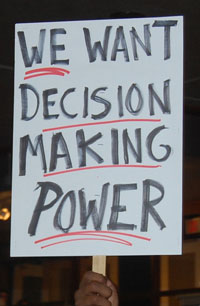 Public forums continue to be held where the public can come together to form opinions about current education policy. But these forums are also spaces to present and deliberate on alternative visions. These forums can help us develop new metaphors to guide our thinking.
Public forums continue to be held where the public can come together to form opinions about current education policy. But these forums are also spaces to present and deliberate on alternative visions. These forums can help us develop new metaphors to guide our thinking.
One crucial aspect of this work is to seriously consider our inherited cultural understandings of human motivation, and how these theories of motivation inform our theories of governance, and how these, in turn, inform our vision of what kind of society we want for our children, and what kind of society young people desire as well.
For, if we are to accept being governed by chance reward and generous punishment, we are also accepting the dictate of those few who now control the high-stakes machinery of the punishment-as-accountability regime that is destroying public education. But people do not accept tyranny.
In the end, the political and psychological essence of high-stakes testing reveals that it is the architects and their boosters — not teachers and parents — who have low expectations for students and the future of our society. Their vision is a dystopia. High-stakes testing is zero-tolerance for real learning, zero-tolerance for democratic living, and zero-tolerance for human flourishing.
But a growing number expect far more than a “boost in scores,” “a job” and a Facebook account. We reject having no say. We can, must and will do much, much better.
Notes:
1) Note that the standard economic notion of public good is in conflict with the zero-sum assumption of current education policy, whether one considers lottery methods for accessing education or the increasing use of competitive grants to fund education initiatives. This is -imposed scarcity as a means of control.
2) See Ryan, Richard M., and Netta Weinstein. “Undermining Quality Teaching and Learning: A Self-Determination Theory Perspective on High-Stakes Testing.” Theory and Research in Education 7, no. 2 (2009): 224–233. http://www.selfdeterminationtheory.org/SDT/documents/2009_RyanWeinstein_TRE.pdf.
[TOP]
Full Funding for Education Now
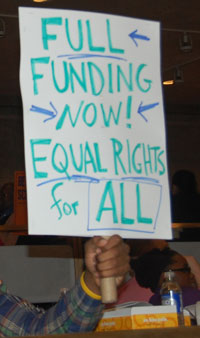 Three busloads of people from Buffalo, including mostly African American youth, organized to go to Albany January 14. The action bought to the fore the need for full funding for public education now. The minimum funding being demanded is $1.9 billion for this year. As well protesters called for New York State to fully pay the $5.5 billion won in the lawsuit demanding more equal funding for all schools. Only a portion was paid in 2007-2008 and billions are still owed. As the slogans emphasized, the state has responsibility to Educate Every Student! No More Excuses!
Three busloads of people from Buffalo, including mostly African American youth, organized to go to Albany January 14. The action bought to the fore the need for full funding for public education now. The minimum funding being demanded is $1.9 billion for this year. As well protesters called for New York State to fully pay the $5.5 billion won in the lawsuit demanding more equal funding for all schools. Only a portion was paid in 2007-2008 and billions are still owed. As the slogans emphasized, the state has responsibility to Educate Every Student! No More Excuses!
The action began with an assembly that brought the hundreds of protesters from across the state together for lunch and speeches from organizers and various legislators. It was announced that about 75 percent of those participating were youth of all ages, from elementary to high school and university and young workers.
A spoken word performance by a group of students brought the greatest applause. It emphasized that the youth are not satisfied with just a few “pretty good” schools and want public schools that meet their needs and their striving to contribute to advancing society. They want the best and they want it for all and will not accept anything less.
The assembly was followed by various activities, including group meetings with legislators, letter writing and making videos expressing concerns and demands to fully fund education. Some were participating for the first time and others had experience talking with and writing to legislators. Some of those who have done such activity before brought out that legislators often talk like they are supportive, but their deeds are to concede on budget matters and say there “is no money.” As one of the signs emphasized, one solution is to Stop Funding War and Fund Education! As part of preparing to see legislators there was also discussion among some on the importance of taking a strong stand. We were not going to beg the legislators to do what is needed. We were going to present our demands, speak to our experience on their necessity, and call on legislators to join that stand.
On the ride home people expressed their readiness to continue demonstrating and organizing to defend the right to education, in Buffalo and Albany. Youth made clear they are not going to sit and wait for the legislators — they are going to organize among themselves and strengthen their unity as vital to winning their rights.
The action was organized by Citizen Action New York and the Alliance for Quality Education. The Buffalo youth participating included many from Teens in Progress as well as a sizeable delegation from Burgard High School. Another demonstration is planned for March and many are already working to increase the numbers and organized quality of participation for that action.
[TOP]
(The following material was done as a spoken word performance by Majahzi Jacque at a recent conference defending the right to education and demanding full funding now, November 20, 2013 in Albany. It is adapted from a skit collaboratively conceived and written by youth organizers Emerald Wilcox, Denzel Loyd, Majahzi Jacque, Narasonda Gibbs and staff of the Center for Teen Empowerment, Rochester, New York.)
* * *
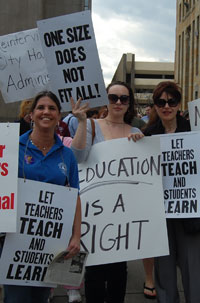 I would like to ask everyone to close your eyes and walk with me on a visual journey. Take a deep breath, relieve the stress and let your mind be at rest….
I would like to ask everyone to close your eyes and walk with me on a visual journey. Take a deep breath, relieve the stress and let your mind be at rest….
You walk into a bright building and instantly feel welcome. There are no metal detectors and you aren’t treated like a felon. Where teachers can ask “What’s wrong” and there’s nothing you can tell them because this school is a place where negativity is seldom. Well um, to me that seems fair.
Nobody’s ever late to class because they actually want to be there. You can set down your items and don’t have to worry that your bags will be missing. The administrators actually listen when tragedy’s stricken.
It’s a place you want to go to because you know all is well. A place where you’ll be heard instead of hauled off to jail. It’s not something you just have to get through. But when you wake up it’s somewhere you want to get to.
When it comes to extracurriculars it’s your call, whether you want to dance or act or just play ball. Plus when you’re walking down the halls you often have to pause in awe of all the students’ art that’s sprawled along the walls. Because even though there’s still math on your to-do list, there is also art and music. Even the cool kids do it. Instead of being robotic, teachers engage you with logic. They show you that education is the key and then tell you how to unlock it. The staff and administrators are all on the same page so that we can use that key to release your dreams from their cage.
No teacher ever neglects you, but connects you to the topic and shows you how it affects you. They help you from step one to step two and when the subject is done they never let you forget too. The school prides itself on its sense of unity and you always feel part of that larger community….
School Bell rings
Wake Up Wake Up Everybody! Make a line over here. Get your backpacks off. No No No, not around it, walk through the scanner. C’mon, you know the drill. Step over here….
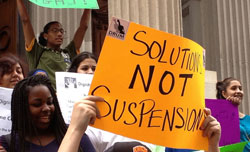 He woke up late with no food, now he’s being treated like a criminal in this jail, I mean… school. He hears more orders, more rules, “No hoodies, phones or hats, everyone get to class.” But his class is so packed and there’s a lot that it lacks.
He woke up late with no food, now he’s being treated like a criminal in this jail, I mean… school. He hears more orders, more rules, “No hoodies, phones or hats, everyone get to class.” But his class is so packed and there’s a lot that it lacks.
Teachers, Sentries, and principals have been quick to kick him out, rarely taking time to find what the situation is really about.
We’re trapped in a revolving door. Suspensions and arrests are rising more and more, leaving kids to roam the streets like they’re out on tour.
They’re clipping our wings and then telling us we can soar.
When you can go straight from school to jail, isn’t that a setup for us to fail? Cycles of poverty, can’t even post bail, just like a dog forever chasing its own tail.
Meanwhile, the teachers’ lives are really stressed with new curriculum and standardized tests, knowing they’re not giving students their creative best. Teachers are limited in this chore. And can’t do more because they’re scored by the Core.
The arts have been cut and with our luck so will sports, teachers and I don’t know what.
They must bridge the gap between reality and expectation, between student and teacher, between policy maker and educational seeker.
Can they really be the next official or president? Then where’s the evidence? We’ve been behind since first grade and have been falling backwards ever since.
High expectations are what we need… counselors and resources, so we can succeed.
Where are the voices that speak for the youth? If we don’t have that then we can’t get the truth. If you don’t believe me then all the kids here today is the proof. Our schools need us as a part of the Crew - No passengers on this ride… Students, staff and teachers can’t choose sides…
If you’re with me in the crowd, I want to ask you to please stand up.
Because, it’s time to stand for what’s right. And without our fists, let’s put up a fight!
[TOP]
